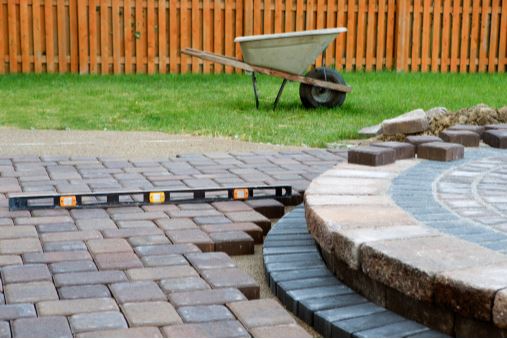
Do you love the look of natural stone and concrete but don’t have much money to spend on your outdoor space? If so, pavers might be a great option for you. While concrete is generally more affordable than stone, it can also be much more expensive depending on where you live. That’s because the cost of concrete tends to vary widely from one area to another. It can cost as much as $10 per square foot in some places. If you’re on a budget and want an outdoor space that feels like natural stone or concrete without breaking the bank, pavers are a more affordable alternative to poured concrete or stones. Pavers are made of small pieces of stone—usually in the range of 2-5 inches—that are set in cement to have a smooth finish.
Why Should You Install Pavers Over Concrete Patios?
When you factor in the price of concrete and installation versus the cost of pavers, it’s easy to see why so many homeowners opt to use pavers in their outdoor spaces. After all, depending on where you live, you can expect to pay $4-$10 per square foot for poured concrete. That works anywhere from $400 to $1,000 for just a 10 x 10-foot patio! By contrast, the average cost of installing pavers is $2-$4 per square foot, from $40 to $80 for the same space. Concrete does have some benefits over pavers, though. It has a longer lifespan and is more durable than pavers. However, that doesn’t necessarily mean it’s a better choice. After all, a concrete patio may need to be re-poured every 15-20 years as it ages. As for durability, concrete is more vulnerable to cracking, chipping, and breaking than pavers. Hence, you should install pavers over concrete patio.
What to Know Before Installing Pavers?
Before installing a paver patio, you’ll want to ensure you have a solid foundation. Before shopping for pavers, you should dig up a few test holes in your yard to ensure the soil underneath is dense enough for providing good support. You can use a shovel or an excavator to dig holes—whatever is most convenient. Once you’ve dug your holes, you can test the soil to see if it meets the following requirements: – Soil must be at least 6” deep – Soil must be well-drained – Soil must be high in organic material – There must not be large rocks in the soil Once you’ve confirmed your soil is suitable, you’re ready to install your paver patio!
Reasons to Install Pavers Over Concrete Patio
Unlike concrete patios, which are usually a solid color, pavers come in various colors, sizes, and textures, allowing you to create a truly unique patio design. You can mix and match different colors and textures to create an even more unique design. One thing to keep in mind is that in most cases, it will cost a little bit more to install pavers than it does concrete. However, the extra investment is worth the versatility and style you get. If you live in a rainy area or have a high water table where you live, concrete can be a poor choice. That’s because concrete can be porous and can absorb water, which can then cause your patio to crack, chip, and break over time. Since pavers are not porous, they are less likely to be damaged by water.
Pavers Are Highly Durable
While concrete has a slight advantage in durability, pavers are not far behind. Some types of pavers can last up to 50 years! Pavers are made from stone, clay, or concrete, highly resistant to weathering. Because pavers are so durable, they won’t deteriorate over time.
Pavers Offer Many Different Color Options
Concrete may be a better choice if you want a more colored patio. That’s because concrete is easy to dye to any color you want. In contrast, pavers are usually just made in natural colors like brown, gray, and black. However, it’s important to note that you can still customize the look of your patio with a concrete patio. It’s just a matter of adding a color wash. A color wash is a stain you apply to the concrete after it has been installed. It adds color to the concrete but does not change its texture.
Pavers Are Very Versatile
In addition to being highly durable and resistant to weathering, pavers are also quite versatile. They are much more than just a patio material, which is one of the main reasons they are popular. You can use pavers for much more than your patio. You can also use them for a front entryway, walkways, walk-out decks, and walk-out decks.
Final Words
Concrete is a fantastic patio material and has many benefits over pavers. However, pavers are a fantastic choice if you want a more affordable patio with more color options and more versatility. If you’ve been dreaming of a natural stone or concrete patio but don’t have much money to spend, pavers are a great option.
